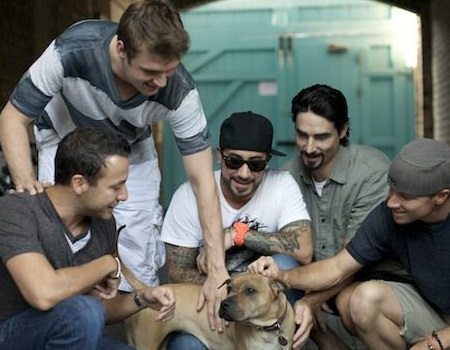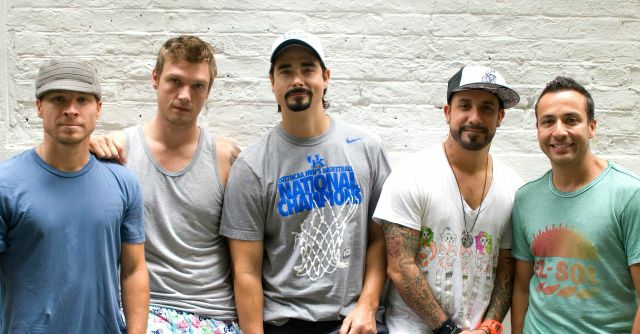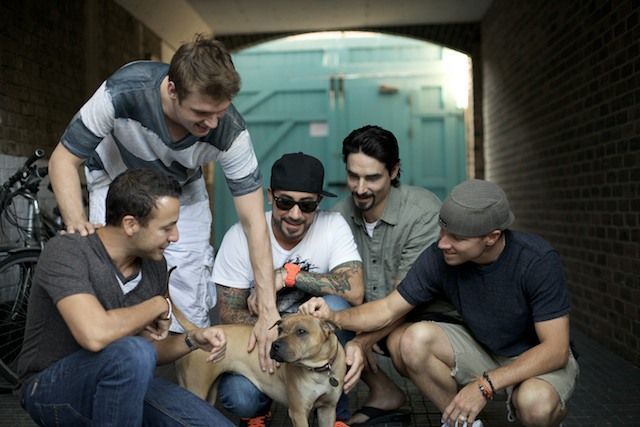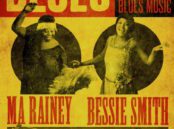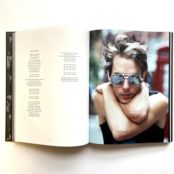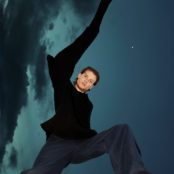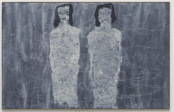[dropcap style=”font-size:100px; color:#992211;”]D[/dropcap]irector Stephen Kijak is best known for his award-winning documentary Scott Walker: 30 Century Man.
Having worked with music legends such as David Bowie, The Rolling Stones and Metallica’s Rob Trujillo, his latest documentary is about ’90s pop sensation Backstreet Boys.
Trebuchet’s Chris Patmore talks to him.
Why did you decide to make films about musicians?
The problem is, you do one of them very well and you’re stuck for life. It was really the Scott Walker movie that got me into it. I didn’t even set out to do documentaries. I studied filmmaking, and did scriptwriting and narrative work, but Cinemania was the first doc, and it’s more of a case of a character that presents itself to you that you couldn’t have made up, which then pulls you in and you find yourself making a documentary.
Scott was one that I pursued. That was my passion project. I was a HUGE fan, and it was a combination of my admiration for him and his music, and mostly in the US he was an unknown factor. He was incredibly reclusive but about to make a new record; his first in a decade. So factors combined and you find yourself making that one. That was a huge undertaking, and a good five years of uphill struggle of fundraising and fighting for access. That was the passion project for me and it ended up doing very well.
Off the back of that I got a call from The Rolling Stones. So it just snowballs and I found myself in a pretty sweet spot with these music films. Part of you wants to run screaming from another one, but at the same time, you feel like it is an opportunity to try and do one that was different from the last, and embrace a story that you wouldn’t have expected to be interested in. Case in point: Backstreet Boys.
So that’s how I came to it. This was really the one where it was truly like, ‘Let’s make a film about something that at one point in your life you actively disliked, and try to find a way in’.
You say you didn’t like the music, so was it the story that drew you in, rather than the music?
Absolutely. The music was the last thing on my mind. My producer Mia Bays gets all the credit for kicking this thing off. She took it on for Pulse Films, she started rolling the ball on the shoot, and then convinced me to jump on with her for the whole ride. It was about the stories, first. It was about character. They were in a really interesting place. They were in a bit of an underdog space, no record label and trying to take a next step fully on their own. I think what they wanted to do with the film was really appealing. They did want something intimate and real. They wanted to be unguarded. They weren’t thinking of this as a promotional film. They wanted to make a real movie.
When they talk about Some Kind of Monster, you know, Nick was really into films and loved the documentary about A Tribe Called Quest, which I’d just seen that week, so I thought their heads were in the right space to do something like this. The creative team was great: my old producer, the guy who edited my Stones movie was going cut it, Pulse Films is a respectable and cool company.
It just seemed like a great opportunity. They sell you because they are so likeable. It’s kind of ridiculous how charming and likeable they are, as people. It just made me feel like a real asshole for being such a snob and saying, ‘Boo! No! Backstreet Boys, I can’t do that. That’s not cool.’ I thought, ‘Dummy. What a great idea. Do the film you never wanted to do, or expected to do.’ I’ve done the fanboy movie, so let’s do something different for a change. It all came from the characters and went from there.
Do you like working with musicians? Obviously you’ve worked with actors, but do you find musicians a completely different breed to work with?
They’re a totally different breed, and come with their own challenges. I’m less passionate about documentaries than I am about music, which is what draws me in. I was always in bands. In high school I played the drums. My Scott Walker motivation was I wanted to be him. I wanted to be a cool, arty crooner. Wouldn’t that be excellent?
I love their world. I love music and have always loved music. It’s a space I really enjoy being in. For me, pushing outside the comfort zone is the choice of subject matter now, as opposed to doing something you really love. Finding the process and finding the creative link to my own interests in something like the Backstreet Boys, that’s what kind of fascinates me know.
Music documentaries seem to be more popular now than they have been for a while, with some really great ones in the last couple of years. Why do you think that is? Is it that people are just fascinated by the world of music?
I don’t know. It’s great to feel that you are in a renaissance in the form. There are almost too many. Everyone seems to have a rock doc about them now; some more skilled than others. When a music film can win an Oscar two times in a row, that’s pretty extraordinary. But they were extraordinary stories. For me, it’s the behind-the-music tabloid angle has been so worn out that I think that filmmakers are finding that there is an opportunity to retell that narrative and find a new way into these stories that isn’t the formula.[quote]sometimes, when we are working
with people they go, ‘Oh,
it’s just facts, you have to get
the facts in the right order’.
I’m like, ‘No, you have to riff.’
To me feelings are more
important than facts[/quote]
It’s a combination of things. Can we shine light on something that has been hidden, like the Scott Walker movie, or celebrate something in a way that we would never would have in the past?
That is why 20 Feet From Stardom was such a revelation because it was about people that weren’t in the spotlight.
Exactly. And these voices in these songs are part of our collective consciousness. Part of why it was so emotional was we all know these songs, but we never knew these stories. That was just a winning combination right there.
Same with Muscle Shoals. Finding out the guys playing on these iconic soul tunes were these white guys from a little town in Alabama.
It was so good. Aretha’s whole catalogue! It was extraordinary. It’s the revelation. Searching for Sugarman couldn’t be a better example. You can’t duplicate that. That’s like lightning striking to find a story like that. Like Muscle Shoals, that’s a story that has existed and no one’s bothered to tell it before. I just love music and want to get inside these stories. Some of them may end up on the superficial end of the spectrum, such as a film by Beyonce about Beyonce. But on the flip side I can’t wait to see this M.I.A. film that’s coming out. And Missy Elliott has been grinding away trying to do a film about her life, for years. I can’t wait to see that one.
You do need people who are passionate about the subject, rather than someone who is going to knock out something to cash in on an artist’s current popularity. You need filmmakers willing to put in the time, without expecting a return, because most docs never make any money.
This one was a unique situation because we felt there was a significant commercial potential, but once we started going and cobbled some stuff together, and showed it around a bit to some sales agents in the UK, and got quite an enthusiastic reception. Like I said, I turned the job down twice because I thought, ‘Oh God, no one is going to want to see this – a has-been nineties pop band – this is a disaster waiting to happen’. But, in fact, it was the complete opposite.
That’s the thing, once you got locked into it you became such a champion for them, you could see this film unfolding before us. During the production there were moments when you thought, ‘We have got a really great film on our hands’. You felt it as you were doing it. Then you become super passionate about it. You have to. If it was just a pay cheque it would have been just awful. You’re right, and it ended up taking twice as long as we thought it would, because we just wanted to dig in and really make it great, and it needed the time.
Of course, when you make a documentary, you can never be sure what is going to happen because you don’t have a locked-off script, like in narrative fiction, where you know how many pages you have to film in a certain time.
Sometimes you do. There is this school of more scripted documentary, especially if you are working with narration, if a very specific narrative exists, like something more historical. The Backstreet Boys clearly did have a beginning, middle and end narrative to their existing career, but because they’re in a moment of uncertainty about a new album and a tour, you wanted it to be as unscripted as possible. That’s always the most exciting for me.
I just did a film where I had to interview 70 talking heads, and I was so sick of sitting in a room interviewing people. Stick them in a little white van, drive around and see what happens. The opportunity to do that and make it up as we went along was really refreshing. That’s when it’s the most fun, when you don’t know what the fuck is going to happen around the next corner. The trying to balance that with a slightly more traditional archive narrative construction, regarding their history, and then to find the door to just open it back up into experience. That’s what was fun about this one.
Does having been a drummer influence the way you make a film, because a drummer needs a good sense of rhythm, as does a film?
With my editor Ben Stark, who cut Stones in Exile, we literally locked into a groove in the editing room. The guy is lyrical and mercurial, and he’s very musical. To me it is musical. That’s why, sometimes, when we are working with people they go, ‘Oh, it’s just facts, you have to get the facts in the right order’. I’m like, ‘No, you have to riff.’ To me feelings are more important than facts, a lot of times.
To me, the Scott Walker film was a big mix tape. I just wanted to turn people on. And music taps into an emotional place in people that is intangible. You want the film to do the same thing. My drive is to always get back to a more imaginative, narrative, lyrical space with my filmmaking, but when you are dealing with documentary and fact-based stuff, you do also have the opportunity to do that: with the way you shoot, the way you cut. It’s hard.
On a past project I was working with an editor who was so logical and intractable, and you think, ‘Dude, just loosen up! Just pretend you’re a jazz musician’. It sounds pretentious but that has always been my philosophy: it’s got to move like a piece of music. It’s got to have a rhythm, it’s got to have a feel. It’s really all about feel, and that comes from how you shoot, as well as how you cut. I do like to work with real stylists, in front of the camera and in the cut.
I have a great graphic artist, Alison Moore, a brilliant, brilliant graphics person in the UK, who helps me with a lot of that stuff, to bring it to a level that makes it feel like it’s really singing.
I guess you saw the Ginger Baker doc, which used animation to visually fill in gaps in the story, which adds a new dimension to documentaries.
It’s wicked. That is amazing. And he’s just fucking crazy. It’s a great story. You just have to get into sympathy with your character and your subject, and everything comes out of that. If you can find that kind of honest space between you and your subject, that’s where it really comes alive.
BACKSTREET BOYS: SHOW’EM WHAT YOU’RE MADE OF will screen in cinemas nationwide for one night only on 26 February, followed by a special performance by the band broadcast live by satellite
[button link=” http://www.backstreetboys.com/international” newwindow=”yes”] Backstreet Boys[/button]
Chris Patmore is a photographer-designer-writer in order of creative satisfaction, or a designer-writer-photographer in order of current earnings. After becoming totally disillusioned with the world of film journalism he has returned to his first loves: music and photography. Sirius Flatz, manager of Molotov Jukebox, says, “Chris has what one could call a musical eye, capturing bands in their perfect moments.”

